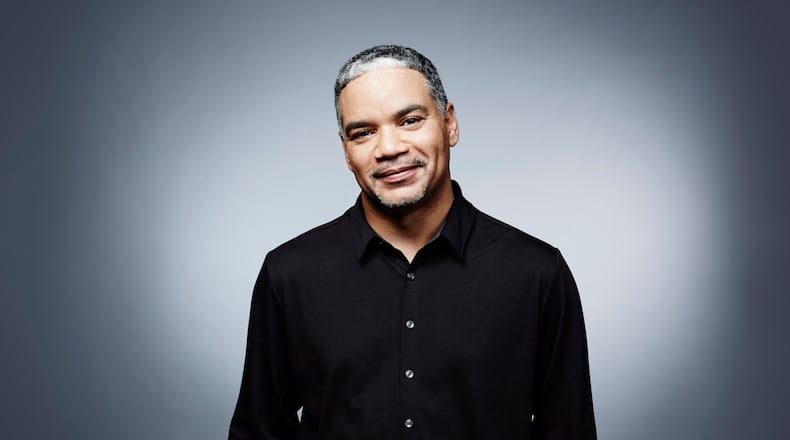CNN writer/producer John Blake’s riveting memoir, “More Than I Imagined: What a Black Man Discovered About the White Mother He Never Knew,” chronicles the former Atlanta Constitution staffer’s transformation from an angry, motherless boy navigating the dangerous streets of West Baltimore to an accomplished man who expands his definition of family to make peace with his past and ultimately the greater world.
The honesty Blake adheres to while revealing his inner conflict, admitting his story contains elements “too contradictory, embarrassing and strange to share” before laying himself bare, is the guiding light in his memoir. He doesn’t shy away from his anger, the complexity of its sources or its impact on his life. Instead he paints a palpable landscape of his reality, starting with childhood. “I came into the world with half my identity amputated,” Blake writes in the opening chapter about the absence of his mother’s name from his birth certificate.
Born racially mixed in 1964 when interracial marriage was illegal, he knew his mother’s first name was Shirley and her skin was white, but he never saw her face. Blake and his younger brother Pat were given no answers regarding her whereabouts. Blake’s father, Clifton Blake Sr., was a merchant mariner who sent his boys for months at a time to unofficial foster care where they suffered terrible mistreatment. By the time Blake and Pat realize they’re both drinking toilet water at night to survive, it’s impossible not to share in his outrage.
The racial messaging Blake receives confuses him further. His neighborhood is a place where “many despise white people.” He perceives being “mixed” as shameful and pitiable. Yet his father views his own “Blackness like an unpaid parking ticket,” preferring to ignore it. And Clifton proudly introduces Blake and Pat as his “half-breed sons.” Blake endures by keeping his head down and focusing on three things: his wonderful paternal Aunt Sylvia, his responsibility to look after Pat and his library card, which provides him escape.
There are strange incidents in his childhood — one with a white couple who take him to fly a kite, another with a white man who sneaks into his room at night and steals his birthday cards — that leave lingering questions that follow him into adulthood.
Credit: Handout
Credit: Handout
It would be easy to vilify Blake’s father for his neglect, but he takes time to humanize his dad by giving voice to Clifton’s reality. As a Black man growing up in the oppressiveness of Jim Crow America, Clifton discovered sailing with the merchant Marines took him to ports where all men were treated as equals and introduced him to a life where he was “entitled to whatever white men had.” Coincidentally, the Seafarers International Union’s decision to admit Black members prior to World War II provides an important glimpse into the method of racial reckoning Blake uses as an adult to make sense of his life.
Blake’s journey to define his identity is just beginning when he meets his mother during his senior year of high school, and his questions are answered with more complexity than he imagined possible. Shirley Jean Dailey is a long-term patient at Crownsville, a behavioral health hospital. She knows who Blake and Pat are but is unable to maintain conversation or eye contact. Blake’s anger transfers to his dad’s family. Why hadn’t somebody told him his mother was diagnosed with schizophrenia and confined to a mental institution?
Blake comes to learn his parents’ love story and recognizes there wasn’t a place in society for a white 19-year-old college student and Black 36-year-old divorcé hoping to form a family — and that was before Shirley’s break from reality. Already shamed by his mother’s race, Blake now has another source of embarrassment: her mental illness.
A target for his anger does emerge from his family’s stories, however: his mother’s sister Mary. According to his dad, Aunt Mary “didn’t care for Blacks,” and Blake is bitter she made no effort to contact him over the years. He has no interest in meeting her, and it takes decades for him to confront the convoluted feelings he has toward his mom’s family.
Deciding his mother holds no relevance in his life, Blake sets his sights on Howard University, what he calls the “pre-eminent training ground for Blackness” where he’s introduced to an elite world of affluence unlike anything he’s experienced. At Howard, Blake sees West Baltimore through a different lens and is shocked to discover he grew up racially segregated in the North when most of his Southern classmates were integrated.
He realizes he’s absorbed a specific type of violence in West Baltimore, the soul-crushing belief that “I wasn’t as smart as white people.” Doubling down on his commitment to explore the truth from its uncomfortable angles, Blake admits imposter syndrome leads to his academic self-sabotage that nearly gets him expelled sophomore year.
Blake’s life is transformed by his spiritual journey, but walking in faith requires more hard work than easy solutions or quick answers. “First I had to join a community where racial reconciliation was demanded and build relationships with people I regarded as enemies,” Blake writes about his experience attending a “radically integrated” church.
From there he builds the foundation that supports his lifelong pursuit to make forgiveness his moral truth. “More Than I Imagined” is a powerful chronicle of John Blake’s journey that lays out a clear path toward racial healing — not just for his own family but the entire United States.
NONFICTION
“More Than I Imagined”
by John Blake
Convergent Books
240 pages, $27
About the Author
Keep Reading
The Latest
Featured



